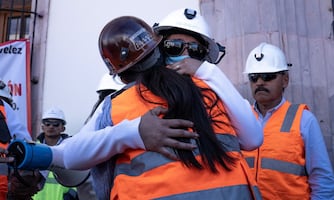Más Información

“¡No fue confusión, fue extorsión!"; mineros marchan en Zacatecas por compañeros asesinados en Sinaloa

¡Por fin! Suspenden contingencia ambiental este San Valentín; prevén mejor calidad del aire este 15 de febrero

Ofrecen cargo en el extranjero a Marx Arriaga, pero lo rechaza; se le planteó participar en otra área: Mario Delgado

Hijos de capos mexicanos estuvieron en escuela de élite de EU: Departamento de Tesoro; pagaron hasta 102 mil 235 dls por año
Under the thick jungle canopy of the state of Yucatán , in southeast Mexico, Sergio Grosjean and his team of archeologists have discovered two caves that hold treasures of peculiar beauty: Cave paintings and a petroglyph representing an ahau: a Maya dignitary, leader, or king.
“We believe that one of the images found in the cave represents a way to measure time, though experts from the National Institute of Anthropology and History (INAH) and independent researchers have different hypotheses,” said the archeologist and writer in an interview with EFE .
Both caves found in the jungles of Homún, Yucatán , 100 meters apart, “show hand prints and the shape of a forearm, which has never been seen before in the Yucatán peninsula,” claimed Grosjean.
One of the caves possesses a beautiful groundwater pit ( cenote ) and the ahau petroglyph was not made randomly; “it was made in the cave’s outline on a calcite formation,” he showed.
The investigator and documentary adviser of National Geographic, Discovery Channel, and the BBC , who last year found another cave painting that is still undergoing an exhaustive analysis, commented that the new discoveries, as well as the caves found in Kaua and Akil “confirm the high degree of respect and knowledge the ancient Mayas had of art.”
“This knowledge” he added, “is reflected in their architecture, math, astrology, astronomy, and the construction of giant palaces such as the Pyramid of the Magician in Uxmal, the Ek Balam archeological site, or the Castle of Chichén Itzá.”
So far, the meaning and beauty of Yucatán’s cave art is an enigma that has surprised experts from all over the world, who agree that the caves found in Yucatán’s caves ring possess spectacular beauty that local authorities could use to promote tourism in the region.
dm
Noticias según tus intereses
[Publicidad]
[Publicidad]










